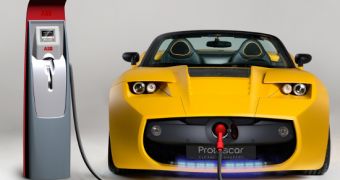Researchers in Brazil have recently taken the time to analyze how the introduction of more electric vehicles in the country's state of São Paulo would affect both the yearly greenhouse gas emissions and power demand. The scientists detail their findings in a paper in the journal Energy Policy.
According to this report, a 10% increase in the state's electric vehicle fleet must be linked to a 1.3% drop in the state's annual emissions, Green Car Congress tell us.
As was to be expected, the researchers also found that this increase in the number of eco-friendly vehicles driven up and down the São Paulo's roads would put extra strain on the local grid.
Specifically, the specialists found that, for every increase of 10% in the state's electric vehicle fleet, São Paulo's overall power demand would up by about 2%.
Should the state's residents switch to using only such cars by the year 2035, the state's electricity demand is very likely to increase by 40 million MWh, the same source details.
In their paper, the researchers explain that, for the time being, São Paulo is Brazil's main state in terms of economy, energy and environment.
They go on to explain that, for the time being, most of São Paulo's yearly greenhouse gas emissions come from the transportation sector.
Hence, as shown by their investigation, the state would greatly improve on its ecological footprint should it agree to promote the use of electric vehicles among its residents.
“In order to reach these goals [reduce annual greenhouse gas emissions] it is necessary that stricter policies for the transportation sector are adopted by São Paulo, as this sector concentrates the largest emissions of the state,” the specialists reportedly write in their paper.
Furthermore, “One of them would be the use of vehicles powered by electricity, as presented in this work, which proved effective in the environmental perspective.”
In order to study how the introduction of more electric vehicles would affect São Paulo's ecological footprint and its overall power demand, the Brazilian researchers used a simulation tool known as the Long range Energy Alternatives Planning System (LEAP, for short).
This tool allowed them to piece together several scenarios documenting the electrical and environmental impacts of a given increase in the state's electrical fleet.

 14 DAY TRIAL //
14 DAY TRIAL //